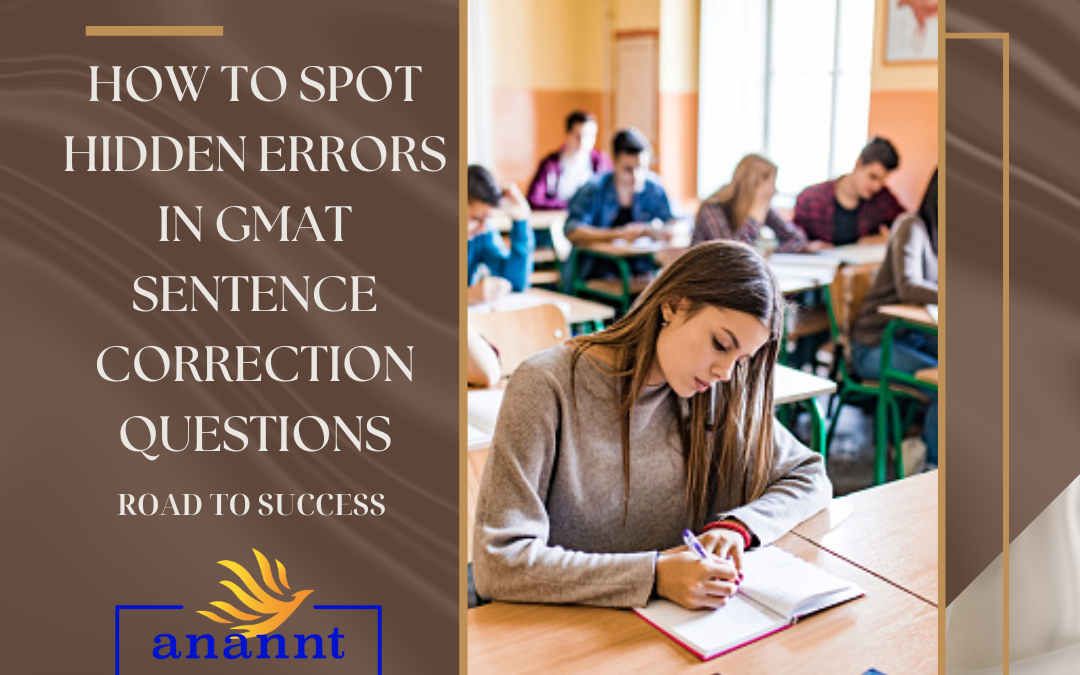
by Nabeela | Dec 23, 2022 | GMAT, Test, Tips
When it comes to preparing for the GMAT exam, one of the most important
and challenging sections is sentence correction. As part of this section, you’ll
be required to identify any hidden errors in a given sentence and choose the
best answer from a list of provided options. While this may seem daunting at
first, there are some useful strategies you can use to make sure you’re able to
spot any potential errors quickly and accurately.
Given below are tips on how to spot hidden errors in GMAT sentence correction questions
Identifying the Grammar Rule at Play
- The first step when dealing with GMAT sentence corrections is understanding
the grammar rule that applies to each question. In order to do this effectively,
you need to read through the sentence carefully and identify any words that
are unusual or confusing.
- Additionally, look out for linking verbs and pronouns
as they can often indicate where errors may be found. Taking some time to
familiarize yourself with different grammar rules beforehand can also be
beneficial; by doing so you will have better contextual understanding on how
various elements interact within sentences.
- This can help narrow down your choices when presented with an array of possible answers.
Checking for Parallelism
- Incorrect parallelism is a common mistake seen in many GMAT sentence
correction questions; it’s important that you take note of any phrases
containing similar verb forms or nouns such as adjective phrases or verb
phrases, ensuring they maintain their structure throughout each part of the
sentence.
- To illustrate this point better an example could be “behaves badly”
appearing in one part of a sentence but “acts badly” appearing elsewhere; in
this case it would not be considered parallel as there is a difference in terms
of verb forms used between both parts of the phrase. So if you notice
something like this occurring then chances are it needs correcting!
Investigating Word Usage & Punctuation
- Aside from grammar rules there are other aspects that need checking such as
word usage and punctuation marks. Make sure all spelling mistakes have
been corrected as incorrect spellings can lead to misinterpretations easily
being made by readers! Also take into account proper nouns used within
sentences – do they match up correctly with other parts of speech? Are they
capitalized correctly? If not then unfortunately this may suggest an error has
occurred somewhere along the line which needs rectifying before continuing
further with your answer choice selection process.
- Additionally check for misplaced commas, apostrophes and hyphens as these too can throw off an
entire phrase or clause if absent from where they should properly be located
within it!
Analyzing Modifiers
- When solving GMAT sentence corrections, modifiers play an important role
too; if these become misplaced within sentences then chances are a
grammatical or syntactical error has been made somewhere along the line
which requires addressing before continuing further with your answer choice
selection process.
- Furthermore check that any adverbs used still make sense
after being switched around with alternative parts of speech within a given
phrase or clause – this could help reveal potential errors which may have
otherwise gone unnoticed due to poor placement or setup originally occurring
within them!
Exploring Beyond Grammar & Syntax Rules
- No matter how well-versed you are in English grammar and syntax rules,
sometimes it’s necessary to go beyond these boundaries when tackling GMAT
sentences corrections – particularly if you’re struggling with learning all of
them upfront! Instead try looking at how certain parts of speech interact with
each other — such as articles or prepositions — and see if anything appears
out-of-place here too; often understanding how language works on deeper
levels can uncover underlying issues even if conventional grammar rules
aren’t broken!
By following these five steps closely when dealing with GMAT Sentence
Corrections questions, you will be able to more easily identify hidden errors
which may otherwise have gone unnoticed — giving you a greater chance at
success during your exam! Even if two phrase structures look identical at first
glance there could still be subtle differences occurring between them which
require narrowing down before reaching your final answer choice decision —
so make sure not forget about details like parallelism, word usage &
punctuation marks (including homonyms), modifiers (particularly adverbs) as
well as exploring beyond traditional grammar/syntax boundaries when needed
against every single question presented during your exam session!
If you need help along the way, our team of experts are here to assist you. Register for GMAT today at the official website. Kindly contact us for any further queries.
Check out our website on the link given below https://anannt.com/

by Jahnvi | Dec 23, 2022 | GMAT
Are you aiming to get a great score on the GMAT Verbal section? If so, then you’re in luck! Here we’ll discuss some useful tips and strategies to maximize your GMAT verbal score and acing this important exam.
Understanding What You’re Being Tested On
The first step toward success on the GMAT Verbal is understanding what types of questions they can ask. The Verbal section includes three categories: reading comprehension, sentence correction, and critical reasoning. The tests include Logic, language usage, grammar knowledge, and problem-solving skills.
Familiarize Yourself with Different Question Types
Take practice tests or study sample questions from books or online resources such as the official GMAT website. After learning what questions will appear on the test. Make sure you understand each question type. How they work and how to identify which kind they will ask to answer. Developing a deeper understanding of each question type will help you be better prepared for any surprises that may arise.
Using Process of Elimination Techniques
The GMAT rewards accuracy more than speed. Take your time when answering questions and think through each one before selecting an answer. One helpful technique is a process of elimination approach. Eliminate the wrong answers, then narrow down your choices until you arrive at the best option. By doing this, you reduce the chances of making careless mistakes and ensures that you won’t be rushed into choosing an answer without fully understanding it first.
Developing Your Vocabulary and Grammar Skills
Having a strong vocabulary as well as a good mastery of English grammar is essential for success in the GMAT Verbal section. Make sure you become familiar with SAT-level words. These often appear in questions testing basic language skills. Additionally, review basic grammar rules such as subject-verb agreement, modifier placement, pronoun usage, etc. As these topics frequently appear in verbal questions too. The more practice you get with these types of questions, the more successful you will be when facing this challenge during the real exam.
Taking Practice Tests & Reviewing Mistakes
Finally, taking practice tests under timed conditions can help get used to the format of the exam. This will also give a sense of how much time should be allocated for each question. After completing practice exams or mock tests, review mistakes to understand why incorrect answers were chosen. So that similar errors won’t resurface during actual testing time.
With dedication and hard work geared towards mastering each aspect mentioned above. Recognizing question types to develop language proficiency. Anyone can maximize their GMAT Verbal score! So put in some effort now and reap the rewards later when it comes time for admissions decisions from top business schools around the world!

by Labhesh | May 6, 2020 | Motivation, Test
Studying abroad develops a lot of
skills in a student that can be a great help for him in his personal life as
well as in developing his professional career.
Some of the top skills you will learn
through a study abroad program are:
1.
Problem-solving skills
(Out-of- the-box thinking) When you
go abroad to study you are going to be responsible for everything. Being on
your own and learning to take care of yourself will teach you how to be responsible
and resourceful. You will be out of your comfort zone, away from your own
people in a foreign country and your survival instincts will kick in. You will
be a more independent and confident person once your program finishes. You will
be used to making your own decisions and will have developed problem solving
skills from your experience abroad. Employers prefer hiring candidates who have
good decision making skills and are quick at solving problems.
2.
Adaptability
You will learn how to be flexible and
adapt according to your surroundings. Although it is a scary process in the
beginning-moving to a new country, but as you adjust and adapt to life then you
will find yourself enjoying in this new environment. You will become a more
attractive candidate for future employers who wish to have employees who have
the capacity to adjust to any situation and make the best of it.
3.
Networking and communication skills
Students who are studying abroad have
to connect to other people in another language or in English. This leads to
them developing better networking and presentation skills in comparison to
students who are studying locally. Exposure to a foreign culture helps them to
understand the world better and thus become successful. With an increased confidence,
communication skills are also improved and this adds to your attractiveness as
a potential employee.
4.
Time Management
Studying abroad will groom you about
effectively managing your time. You will learn how to prioritize tasks and meet
deadlines. These are again very important skills to have in your professional
career. Employers value employees who are well organized, and can do more work
in a given period of time. Simply put, effective time management means higher
productivity, which employers’ value in their employee
5.
Self-Management
When you go on a study abroad
program, you become used to taking a lot of initiative (getting your documents
in order, striking up a conversation with new people etc.), and this develops a
more positive and practical ‘you’. You become motivated and driven to make
things happen for yourself and will constantly be on the lookout to do things
better. This proactive approach is highly sought after by employers. So do grab
the opportunity to study abroad as it can benefit you greatly in the future by
setting you apart from all other job seekers by developing all these skills
outlined above!




Recent Comments